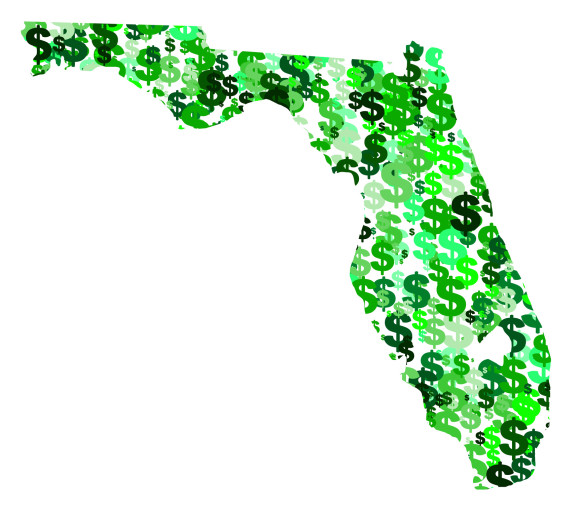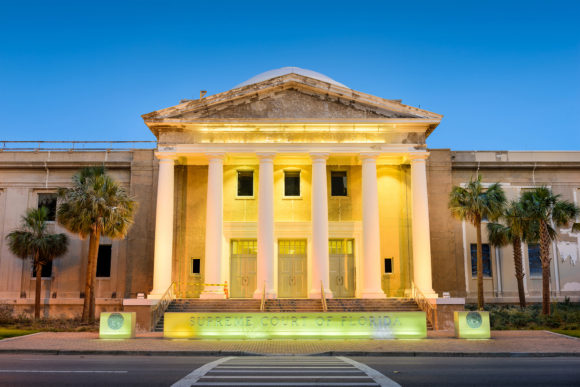It was another busy year for the Southeast region – from Florida’s distressed property insurance market to the COVID-19 pandemic, there was plenty of news to follow.
Some of the top insurance topics this year included:
Florida, Florida, Florida

The Florida property insurance market was a rollercoaster ride this year and Insurance Journal readers were along for it all as stories about the Florida insurance market dominated the headlines. While the state was lucky to avoid a major hurricane in 2020, it still dealt with plenty of issues from past storms and excessive claims litigation.
The year started off with a previously ordered rehabilitation for Florida insurer Windhaven being deemed “useless” by a county court judge, who then ordered the insurer’s liquidation. Soon after, the company ceased operations and its assets were auctioned off. The market’s problems only got worse from there.
Insurer Ratings Drama
Insurance Journal broke the news in January that financial analysis firm Demotech, which rates more than 40 Florida-based domestic insurance carriers, had warned the head of Citizens Property Insurance Corp. that more than a dozen Florida insurers were facing ratings downgrades due to hazardous financial conditions. Demotech President Joe Petrelli penned an update on the Florida insurer downgrade situation for IJ soon after, stating that most companies would receive affirmations while noting the variety of “macro-economic and unique state specific issues” Florida faces.
Florida insurer ratings affirmations trickled out over the next several months for most companies, while the most troubled companies folded or were acquired, including:
- HCI Acquired Policies of Florida’s Anchor P&C; Weston Acquired Anchor Specialty
- HCI Approved by Florida Regulator to Replace Anchor P&C Coverage for 43K Insureds
- Prepared Insurance of Florida Acquired by Lighthouse Property Insurance Corp.
- Florida Insurers Omega, Tower Hill Select Merged into Tower Hill Signature
- EG Insurance Took Over Policies of Defunct Windhaven MGA The Hearth
In April, Demotech revealed its final ratings decisions for the remaining companies while calling the state’s insurance market the “most difficult’ in the U.S.
Rate Increases
In February, several Florida carriers sought staggering rate increases amid the market turmoil. In public rate hearings before the Florida Office of Insurance Regulation, company representatives said the requested rate increases ranging from 20% to 40% were needed for their companies to remain healthy.
Insurers like Capitol Preferred were one of many insurers responding to deteriorating conditions in the Florida homeowners insurance market cause by a combination of AOB, water damage loss claims and several years of major hurricanes, as well as a what insurers call “loss creep” from those claims.
“Unfortunately, times come that you have to do certain things to increase your rates and make sure your company stays viable and functional and healthy,” said Capitol Preferred President and CEO Jimmy Graganella at its Feb. 7 rate hearing for a 36.5% rate increase on one of its insurance programs.
But rate increases were not enough to help the insurer and in May, just weeks before the start of the 2020 hurricane season, the state regulator granted Capitol Preferred’s request to shed nearly 24,000 Policies and began to monitor its operations. In the fall, Capitol Preferred merged its business operations with its affiliate, Southern Fidelity, and soon after the company ceded a majority stake in ownership to Hudson Structure Capital Management, which does its re/insurance business as HSCM Bermuda. The transaction became effective on or about Nov. 12, 2020.
Market in Crisis
Industry experts say the Florida insurance market is heading towards an availability crisis and the market’s problems and potential legislative fixes were discussed in detail in the Insurance Journal series Florida Property Insurance Market Inches Closer to Crisis – Part 1, Florida Property Insurance Market Inches Closer to Crisis – Part 2.
Other Top Florida Market Headlines:
- Florida Legislative Preview 2020: Industry Calls On Lawmakers to Reform Lawsuit Abuse
- AM Best: Florida Insurers Brace for Challenging June Reinsurance Renewals
- Auto Insurer Windhaven National Ordered Into Liquidation by Texas Court
- Ratings Agencies Disagree Over Financial Strength of Florida Family Insurance Co.
- Hurricane Irma’s ‘Last Gasp’: 3-Year Claims Deadline Put to the Test
- Florida Market Stabilization Critical to Reducing Citizens’ Exposure: Study
Strems Suspension

The saga of Florida attorney Scot Strems began in June when he was suspended by the Florida Supreme Court in response to an emergency petition from The Florida Bar. Strems faced allegations that he and his firm were causing great public harm by filing thousands of frivolous assignment of benefit lawsuits against insurance companies in the state.
Strems’ firm was accused by the bar of engaging in “mendacious, bad-faith conduct” and making dishonest or even fraudulent statements to other parties involved in suits, including the court. The bar also accused Strems of illegally filing multiple lawsuits on an individual policy claim, delaying and ignoring court deadlines, and violating court orders.
“Mr. Strems sits at the head of a vast campaign of unprofessional, unethical, and fraudulent conduct that now infects courts and communities across the state,” the bar petition stated.
Strems attempted to have the case against him dissolved but the court-appointed referee found that his suspension was justified and later the Florida Supreme Court rejected Strems’ Bid to Dissolve it. The Florida Bar also filed a petition of contempt against him.
After a September trial, Judge Dawn Denaro, the referee who oversaw Strems’ case, agreed with The Florida Bar that Strems violated 14 bar rules, found of guilty of misconduct and advised a 2-year suspension plus one year probation.
Strems also faces a lawsuit by Citizens Property Insurance Corp. that alleges he filed sham lawsuits against the insurer and engaged in racketeering. Strems has denied all allegations of misconduct against him but testified that he recognized where the firm was deficient in terms of communication and said he could have done better at dealing with problems that had developed at his firm. Still, Strems said he believed his firm “put forth quality representation for the overwhelming majority” of its clients.
Strems testified he didn’t operate the firm to mislead or take unfair advantage of insurance companies, but that generally speaking insurers “do not look to do the right thing for our clients.”
The Florida Supreme Court has yet to make a final ruling on Strems’ case and recommended punishment, though Strems is seeking review of the referee’s report. The Florida Bar has filed an additional complaint against Strems that alleges further Bar violations.
COVID-19

Unsurprisingly, the coronavirus pandemic didn’t just dominate national news headlines and was a top subject in the Southeast as well. From insurance company discounts to how state insurance regulators guided consumers and the industry during the unprecedented crisis, there has been plenty of news to go around.
Southeast regulators issued industry guidance for carriers and agents when the pandemic first began in the U.S. back in March. North Carolina and Georgia regulators declared insurance an essential business so companies could continue working for their customers.
The Florida Office of Insurance Regulation directed insurers to prepare for coronavirus-related interruptions and the Florida Department of Financial Services made an allowance for insurance agency reps who would otherwise be restricted from conducting business outside of a licensed agency to work remotely.
When the economy grinded to a halt back in March thanks to state stay-at-home orders, insurers sought to ease the financial burden on their customers and respond to decreased driving by offering discounts and flexible payment options:
- North Carolina Farm Bureau Insurance Gave Insureds a 20% Dividend on Auto Premiums
- Farm Bureau Insurance of Tennessee Distributed $30M to Policyholders
The Florida Association of Insurance Agents (FAIA) also spoke with Insurance Journal about what Florida agents needed to know during the coronavirus crisis.
Other Top COVID-19 Headlines:
- How Florida’s Strained Insurance Market is Facing COVID-19, Hurricane Season
- Florida Directs Workers’ Comp Insurers to Comply with COVID-19 Treatment Order
North Carolina Political Drama

The very public drama of North Carolina insurance magnate and political donor Greg Lindberg came to a head this year as a federal jury found the former Eli Global CEO guilty of conspiracy to commit honest services wire fraud and bribery.
North Carolina Insurance Commissioner Mike Causey, who wasn’t accused of wrongdoing, played an important role by alerting authorities and cooperating with the FBI investigation to prove Lindberg was trying to bribe him in exchange for special treatment.
Lindberg, an insurance and investment firm founder, was among the state’s top political donors in recent years, giving more than $5 million to state and federal candidates and committees since 2016. He mostly favored Republicans but also donated to Democrats.
Prosecutors in the case against Lindberg said he had shown no remorse for what he had done and pushed for a 14-year sentence, though he ultimately received a sentence of 7 years. Lindberg appealed the conviction but lost and began his prison term in August.
The scandal was raised frequently during the 2020 North Carolina Insurance Commissioner race between Causey and his Democratic challenger Wayne Goodwin. Causey won re-election in November and will serve 4 more years as commissioner, beginning in January.
Read More:
- Candidates in Hotly Contested North Carolina Insurance Race Talk Scandal, Priorities
- Judge Warns of Jury Harassment, Intimidation in N.C. Insurance Bribery Case
- North Carolina Regulator to Modify Moratorium on Lindberg Firms
Southeast Court Cases

Several lawsuit stories piqued readers’ interest this year, particularly those related to business interruption caused by the pandemic:
- Florida Dive Shop Alleges Insurer Breach of Contract, Bad Faith in BI Denial Suit
- Judge in North Carolina Favors Policyholders in COVID-19 Closure Lawsuit
- Claims for Business Income Loss Due to Construction Dust Denied in Pre-COVID Case
- Federal Judge Dismisses Florida Dentist’s Coronavirus Business Interruption Claim
- Insurer Won’t Cover Atlanta House Wrecked by Squirrel
- $100M Suit Filed Against 22 Florida Hotels for Allegedly Allowing Sex Trafficking
Was this article valuable?
Here are more articles you may enjoy.



 Trump Demands $1 Billion From Harvard as Prolonged Standoff Appears to Deepen
Trump Demands $1 Billion From Harvard as Prolonged Standoff Appears to Deepen  Uber Jury Awards $8.5 Million Damages in Sexual Assault Case
Uber Jury Awards $8.5 Million Damages in Sexual Assault Case  Inside the Toxic Legacy of Georgia-Based Mulitbillion-Dollar Carpet Empire
Inside the Toxic Legacy of Georgia-Based Mulitbillion-Dollar Carpet Empire  Zurich Insurance’s Beazley Bid Sets the Stage for More Insurance Deals
Zurich Insurance’s Beazley Bid Sets the Stage for More Insurance Deals 

